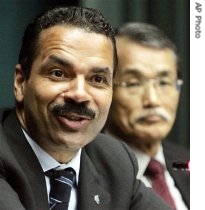2007年VOA标准英语-Interpol to Make Corruption, Other Financial Cr(在线收听)
Bangkok
18 April 2007
Interpol and the United Nations Office on Drugs and Crime are placing new emphasis on combating financial crime, including money laundering and corruption. Ron Corben reports from Bangkok that also officials say they are gaining ground in the fight against money laundering in Asia.
 |
| Ronald Noble, left, answers a question during a news conference as Akira Fujino, a representative of UNODC, looks on, 17 April, 2007 |
At a three-day congress in Bangkok, Noble told why financial crime deserves such high-level attention.
"Financial crime, though it receives far less attention from the media than violent crime, has a devastating impact on individuals, industries, governments and societies," he said. "It is estimated by the World Bank that over $1 trillion (U.S.) is implicated in corruption each year."
Noble announced Tuesday that Interpol plans to set up an anti-corruption academy in Vienna, as part of what he called a "long hard battle" against bribery and other forms of graft. He says the academy is due to open in 2009.
Akira Fujino, East Asia and the Pacific representative for the U.N. Office on Drugs and Crime, or UNODC, says emphasis also has to be placed on the fight against threats to financial systems and institutions through the use of high technology.
"We are dealing with a scenario where legal business activities and institutions - such as information technology, banking, financial markets and services - are increasingly exposed to criminals.," he said "This calls for a comprehensive response including the banking industry, government institutions and law enforcement and criminal justice."
Fujino says Interpol and its 186 member countries are in a high-tech race with criminals.
"If money is oxygen for terrorists, criminals and corrupt officials, how can we deprive them of it? We need synergy among experts - for example information technology," he said. "Our networks have to be better than the networks of criminals."
The UNODC says Asia is making gains against another of the organization's main targets, money laundering. An official says 31 Asian countries have signed onto the Asia-Pacific Group on Money Laundering, and are committed to putting financial crime laws into place.